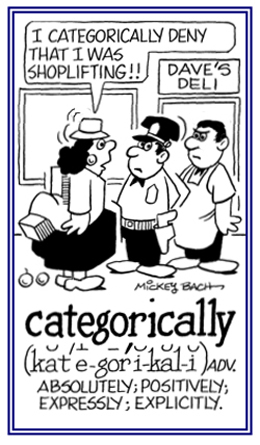-ly, adverb
(A suffix that forms adverbs, primarily from adjectives.)
The -ly ending most often indicates adverbs, and is the usual way of forming them from adjectives.
categorically (adverb), more categorically, most categorically
Pertaining to a statement that is said very strongly, clearly, and in a definite way: Because Mildred received the highest score on the final exam in her biology class, she was accused of cheating by one of her classmates which she categorically denied and the professor categorically confirmed her high achievement as being valid!

© ALL rights are reserved.

© ALL rights are reserved.
Go to this Word A Day Revisited Index


Go to this Word A Day Revisited Index
so you can see more of Mickey Bach's cartoons.
happily (adverb) (not comparable)
Conveying or denoting pleasures: Jim and Mary are happily married.
jocularly (adverb), more jocularly, most jocularly
A description of something or someone who is amusing or intended to cause laughter: Jessi was a man who could make the most serious people smile when he jocularly talked with people.
judiciously (adverb), more judiciously, most judiciously
Characteristic of showing reasonable and practical decisions: Henry provided a judiciously worded statement to his executive officer that clarified the objectives of the committee and their achievements so far.
laboriously (adverb), more laboriously, most laboriously
Relating to a great expenditure of effort, or in a manner requiring much work or difficulty: The lives of the staff were spent in making decisions for others to execute on the basis of data laboriously gathered and analyzed for them
lamentably (luh MEN tuh blee) (adverb), more lamentably, most lamentably
Descriptive of being disappointed and distressed about an outcome of some effort that has been made without success: When Mike's daughter failed her final exam, she was lamentably upset because she thought she had studied enough before going to a movie the night before the test was scheduled to take place.
loathsomely (adverb), more loathsomely, most loathsomely
A reference to something that is disgusting, distasteful, or revolting: Whatever a person thinks is horrible can be considered to be loathsomely unfavorable.
magnanimously (adverb); more magnanimously, most magnanimously
1. A reference to how a person is generous in forgiving an insult or an injury: Petra magnanimously accepted the stranger's apology who bumped into her accidently while they were walking on the crowded sidewalk.
2. Characterizing how someone acts without petty resentfulness or vindictiveness: The soldiers magnanimously treated their enemies with respect.
2. Characterizing how someone acts without petty resentfulness or vindictiveness: The soldiers magnanimously treated their enemies with respect.
maliciously (adverb), more maliciously, most maliciously
Describing doing something in an unkind, spiteful, bitter, or vengeful way: Because Martin had been maliciously mean towards an old dog, the officers told him that he would have to do 50 hours of volunteer work in an animal shelter in hopes that he would learn to have a better attitude towards animals.
manifestly (adverb), more manifestly, mosr manifestly
Characterized by being clear or apparent to the sight or understanding: The decision by the government to lower taxes was manifestly appreciated by its citizens.
marvelously (adverb), more marvelously, most marvelously
1. Extremely well done: The singer marvelously presented his songs for the audience.
2. Wonderfully; strangely; in a manner to excite miraculousness or surprise: For someone who is so young, Marian's musical skills are marvelously disciplined and enjoyable.
2. Wonderfully; strangely; in a manner to excite miraculousness or surprise: For someone who is so young, Marian's musical skills are marvelously disciplined and enjoyable.
mellifluously (adverb), more mellifluously, most mellifluously
Characterized by having a voice that is sweet sounding and smoothly flowing: Henry sang mellifluously to his audience which was pleasing to their ears.
pessimistically (adverb), more pessimistically, most pessimistically
A reference to the tendency to emphasize or to think of the bad part of a situation rather than the good part, or the feeling that bad things are more likely to happen than pleasant things: Kate pessimistically invited members of her class to come to her birthday party.
preponderantly (adverb), more preponderantly, most preponderantly
Pertaining to being dominant in influence, number, or importance: Maureen was more and more preponderantly convinced that her self-published vocabulary book would help an increasing number of students learn a greater amount of words than those of any other publication she had ever seen.
presumptuously (adverb) (not comparable)
Relating to how a person behaves beyond what is right or proper; excessively forward and confident or bold in opinion or conduct in a way that is arrogant, impertinent, or rude: Sam was presumptuously advising his supervisor about how to complete the new contract.
Showing page 1 out of 2 pages of 22 main-word entries or main-word-entry groups.

